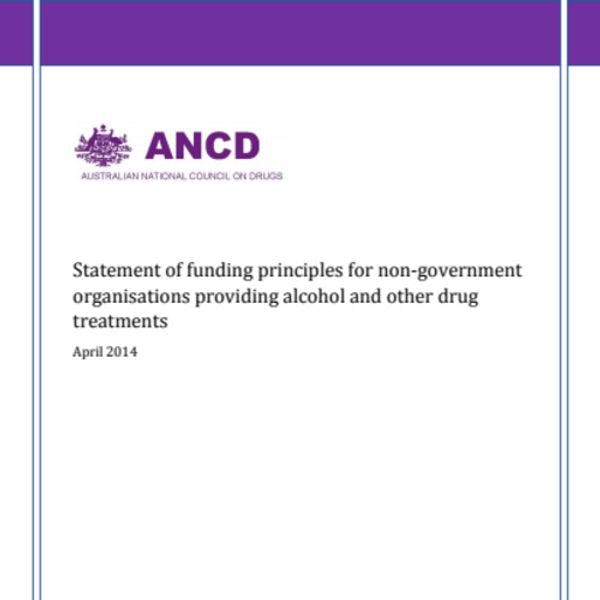Statement of funding principles for NGOs providing alcohol and other drug treatment in Australia
In recent years specialist alcohol and other drug (AOD) services offered by non-government organisations (NGOs) in Australia have been significantly impacted by changes to funding processes at Federal and jurisdictional levels. Further changes are likely to occur. There is much concern about such changes in the AOD NGO sector, and issues surrounding their impact have continually been raised with the Australian National Council on Drugs (ANCD). There are also a number of ongoing issues related to funding.
In recent years there have been significant changes to the funding of health services generally in Australia, associated with health reforms and changes to federal-jurisdictional financial relations. These changes recognise that overall demand for health services will increase in future within a climate of government fiscal restraint, resulting in a need to focus on efficiency and effectiveness to realise sustainable health budgets. Health funding reforms have been instituted, such as those for hospitals via activity-based funding and the new system for primary healthcare.
There is a general lack of clarity within the AOD treatment sector about the long-term effects of these changes for AOD treatment and prevention services, and how AOD funding sits within the larger health funding structures. AOD services are still funded via an undefined combination of Commonwealth, State and Territory Governments. This is in contrast to many other areas of health funding and leads to lack of clarity about boundaries and responsibilities. There is also a need for increased co-operation across all these levels of government to enhance better co-ordination of planning models.
The ANCD supports ensuring that accountable, quality and effective services are available to people affected by drug use. What funding processes and models will be most conducive to delivery of the best quality AOD services to communities, and best meet the needs of those communities, involves a complex set of factors; some of which are subject to rapid change. These include changing patterns of drug use, workforce capacity, individual client and particular community needs, government priorities, and resourcing capacities that must all be considered along with evidence of what works.
In recognition of the need for further information in this area, the Federal Government has commissioned work on a number of relevant areas within several projects. These will include empirical and conceptual research on funding models, mapping treatment need, workforce development, a quality framework for the AOD sector, and other matters.
In this context, the ANCD has developed the following statement of principles for the funding of AOD NGOs.
Our focus is on AOD specialist services provided by non-profit NGOs and does not include AOD services provided by private (general or specialist) practitioners.or private hospitals. The statement aims to articulate the primary aims that should underpin an ideal system for providing funds to the AOD NGO sector. It includes principles which are themed under the achievement of five aims:
- Recognition and utilisation of the particular strengths of NGOs within the AOD sector;
- Cooperative and transparent processes;
- Use of a funding model that is best suited to the AOD sector;
- Provision of funds at levels adequate to cover the costs of best quality service provision;
- Compliance requirements that will support efficient, quality, and effective as well as innovative services.
Keep up-to-date with drug policy developments by subscribing to the IDPC Monthly Alert.
Downloads
Topics
Regions
Related Profiles
- Australian National Council on Drugs (ANCD)
